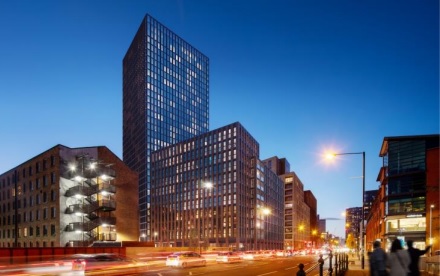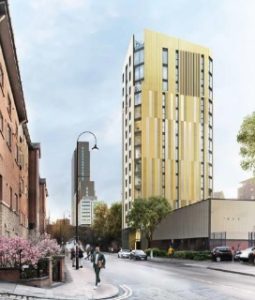£154m residential scheme refused for breaching SRF guidelines

Manchester City Council planning committee has refused a bid to build a £154m city centre residential scheme, providing 485 homes and commercial space, on the grounds it breached the strategic regeneration framework (SRF) for the area.
Today’s (June 30) planning committee reconsidered the application from Affinity Living for the scheme after being “minded to refuse” following the previous planning committee on the basis of the size and scale and impact on nearby conservation areas.
The proposal was for a part-34, part-11, part-nine, part-seven-storey building in Port Street, Piccadilly ward.
A total of 211 letters of objection had been received from two rounds of notification, compared with 34 letters of support.
However, planning officers recommended approval, with planning committee notes saying: “Officers have worked with the applicant in a positive and pro-active manner to seek solutions to problems arising in relation to dealing with the planning application. This has included ongoing discussions about the form and design of the developments and pre-application advice about the information required to be submitted to support the application.”
But Rupert McKay outlined his, and residents’ objections to the proposal at the meeting, saying the developer had not amended the plans.
He said the scheme would have a “domineering and adverse effect on conservation areas” and described it as “excessive in its height and scale” calling for it to be reduced in height, or refused.
Cllr John Flanagan objected to the scheme because it was one storey higher than the 33-storey limit set out by the SRF. He told the committee: “One storey is one storey higher than we have agreed.”
The committee voted by five votes to four to refuse the application.
Two other key schemes, however, were approved.
One, from M1 Piccadilly, was for a 15-storey residential block in Piccadilly ward’s Store Street, comprising 54 apartments.
They are made up of 16 one-bed, two studios, 33 two-bed and three three-bed units.
The committee deferred consideration at the previous month’s planning meeting ahead of a site visit.
There had been 31 objections and one letter of support.

The Store Street scheme
The objections related to the design and scale, townscape, affordable housing, amenity including sunlight and daylight, privacy and living conditions of adjacent residents, traffic, highways and parking provision, loss of trees and biodiversity and the consultation process.
Concerns had been raised over the appearance, created by gold and champagne-coloured panels, with some objectors describing the scheme as an “overly-expensive monolithic example of corporate greed” and a “hideous tower”.
Cllr Sam Wheeler raised an objection over the felling of more than 30 trees on the site pre-application, and hit out at the design, saying: “It’s a horrendously ugly building, a gold-cladded monstrosity. It entirely changes the type of building in this area.”
Cllr Jon-Connor Lyons also raised the issue of the loss of trees, saying: “Replacing 30 trees that were cut down with just one is incredibly offensive.”
In reply, planning officer Dave Roscoe said: “This is a modern intrusion on Store Street. The materials are really high quality and the detail of design is exquisite.”
The application was approved, by eight votes with one abstention, on condition that the applicant replaces the trees and consults the council on the proposed colour of the tower’s panels.
Councillors also approved a scheme which they had deferred at last month’s committee ahead of a site visit.
Developer M&G wants to demolish a 1970s extension to a Grade II-listed building at 50 Fountain Street in the city centre’s Upper King Street Conservation Area.

The proposed office scheme
In place a new six-storey office scheme is proposed, including a rooftop pavilion and terrace, accessed through the retained original Victorian entrance at 49 Fountain Street.
The new build would comprise glazed and aluminium panels.
A range of objections lodged with the council included one that said the design is “brutal and thoughtless on a site in a conservation area surrounded by listed buildings and heritage assets”.
Other objections said the glass feature is out of character, has no architectural merit and looms over buildings, and the proposed development is unnecessary and the building to be demolished has architectural merit.
However, the application was passed by nine votes, against one abstention.








